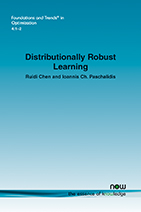New Book on Distributionally Robust Learning
 A central problem in machine learning is to learn from data (“big” or “small”) how to predict outcomes of interest.This learning process is vulnerable to data that may have been contaminated with outliers or are too few to accurately represent the entirety of the actual data. A new monograph develops a comprehensive statistical learning framework that is robust to (distributional) perturbations in the data using Distributionally Robust Optimization (DRO) under the Wasserstein metric. Beginning with fundamental properties of the Wasserstein metric and the DRO formulation, the book explores duality to arrive at tractable formulations and develop finite-sample, as well as asymptotic, performance guarantees. It covers a series of learning problems, including (i) distributionally robust linear regression; (ii) distributionally robust regression with group structure in the predictors; (iii) distributionally robust multi-output regression and multiclass classification, (iv) optimal decision making that combines distributionally robust regression with nearest-neighbor estimation; (v) distributionally robust semi-supervised learning, and (vi) distributionally robust reinforcement learning. A tractable DRO relaxation for each problem is being derived, establishing a connection between robustness and regularization, and obtaining bounds on the prediction and estimation errors of the solution. Beyond theory, the book includes numerical experiments and case studies using synthetic and real data. The real data experiments are all associated with various health informatics problems.
A central problem in machine learning is to learn from data (“big” or “small”) how to predict outcomes of interest.This learning process is vulnerable to data that may have been contaminated with outliers or are too few to accurately represent the entirety of the actual data. A new monograph develops a comprehensive statistical learning framework that is robust to (distributional) perturbations in the data using Distributionally Robust Optimization (DRO) under the Wasserstein metric. Beginning with fundamental properties of the Wasserstein metric and the DRO formulation, the book explores duality to arrive at tractable formulations and develop finite-sample, as well as asymptotic, performance guarantees. It covers a series of learning problems, including (i) distributionally robust linear regression; (ii) distributionally robust regression with group structure in the predictors; (iii) distributionally robust multi-output regression and multiclass classification, (iv) optimal decision making that combines distributionally robust regression with nearest-neighbor estimation; (v) distributionally robust semi-supervised learning, and (vi) distributionally robust reinforcement learning. A tractable DRO relaxation for each problem is being derived, establishing a connection between robustness and regularization, and obtaining bounds on the prediction and estimation errors of the solution. Beyond theory, the book includes numerical experiments and case studies using synthetic and real data. The real data experiments are all associated with various health informatics problems.
Distributionally Robust Learning provides a detailed insight into a technique that has gained a lot of recent interest in developing robust predictive and prescriptive models from data. It will be enlightening for researchers, practitioners and students working on optimization and machine learning.
The book is available from Now Publishers and Amazon.